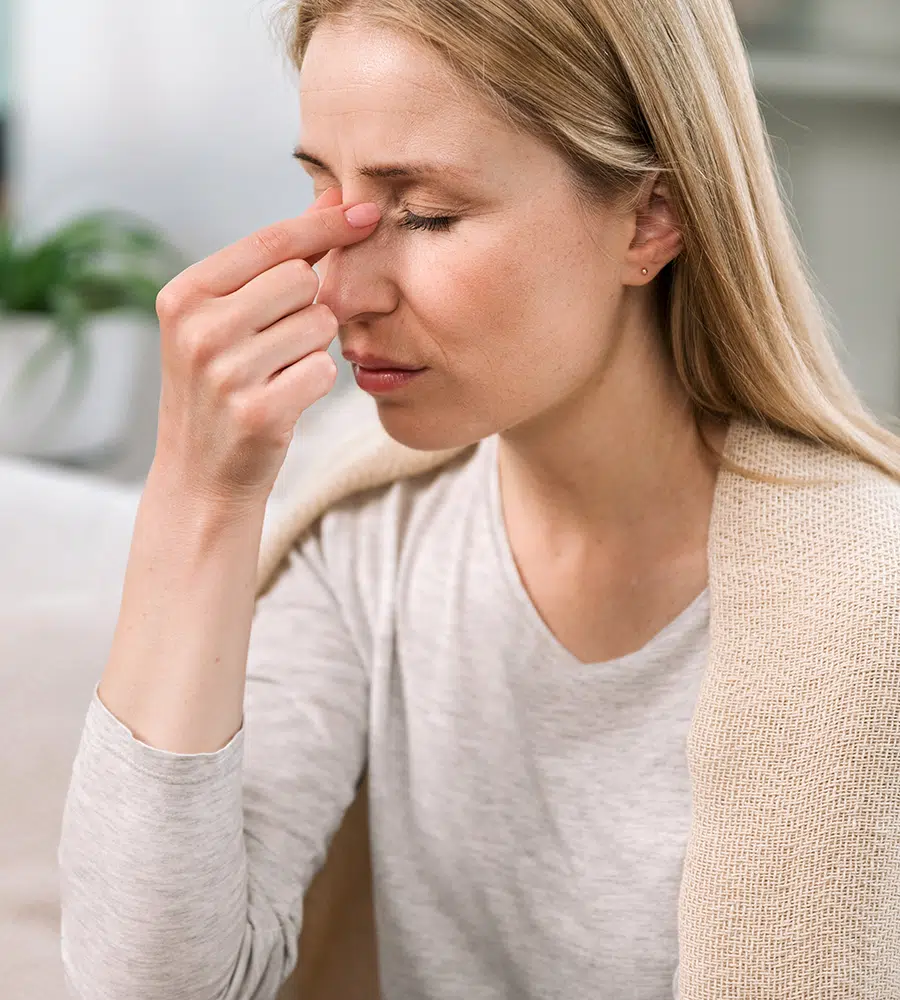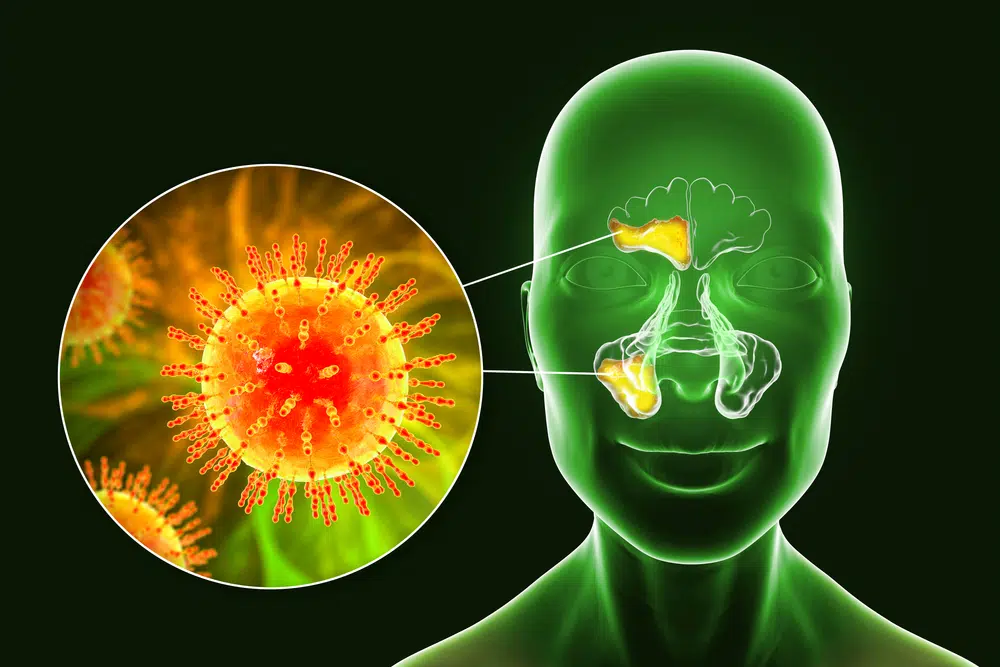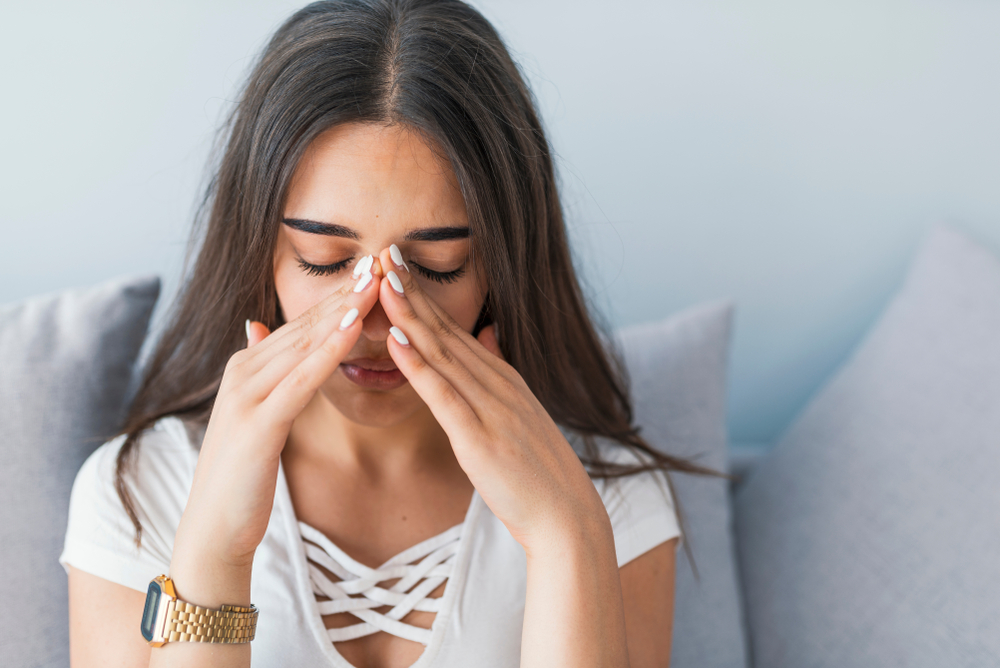Sinusitis (also called a sinus infection) is really common and affects millions of people all over the world. Most of the time it’s caused by a virus or bacteria, but allergies or even the way your nose is built can also trigger it.
It can feel a lot like a cold — stuffy nose, pressure in your face, maybe even a headache — which makes it tricky to tell the difference. And one of the biggest questions people have is: can you actually catch sinusitis from someone else?
The answer is: sometimes, but not always.
- If your sinus infection started from a virus (like after a cold or the flu), then yes, that virus can spread when you cough, sneeze, or are close to other people.
- But if your sinus infection is bacterial, allergy-related, or just from swollen sinuses, then no — you can’t pass it on to anyone.
In this article, we’ll break down what sinusitis really is, when it can spread, and how you can spot the signs.

Is sinusitis contagious? How to stop it.
Sinusitis itself is not contagious, think of sinusitis (a sinus infection) like a stuffy, swollen nose that just won’t quit. The big question: can you actually catch it from someone else? The short answer is: sometimes, but not always.
Viral sinusitis (contagious)
This usually happens after a cold or the flu. It’s not the “sinusitis” itself that spreads, but the virus behind it. If someone coughs or sneezes near you, those germs can give you the same cold or flu, and then your sinuses might get infected too.
Bacterial sinusitis (not contagious)
This type happens when bacteria grow in blocked sinuses. You don’t “catch” it from someone else — it’s more of a complication your body develops on its own.
Allergy or chronic sinusitis (not contagious)
If your sinus problem comes from allergies (like pollen, dust, or mold) or from things like nasal structure issues, there’s no spreading at all. It’s your body reacting, not an infection.
How It Spreads (when it does)
If it’s the viral kind, it spreads just like a cold or flu:

How to Protect Others
If your sinus infection is from a virus, keep it kind:
💡 Easy way to remember:
Avoid using them for more than 2–3 days in a row. Using them too often can actually make redness worse (called rebound redness). Always read the label or talk to your doctor if you’re unsure.
What is Sinusitis?
Sinus infections occur when the tissue lining the sinuses becomes inflamed or swollen, with several factors contributing to this condition. Viral infections are the most common cause, typically following a cold. If a viral infection persists or worsens, it can lead to a bacterial infection. Fungal infections, although rare, can occur in individuals with weakened immune systems. Allergies can also trigger inflammation and blockage of the sinuses, leading to sinusitis.
Structural issues such as nasal polyps or a deviated septum can impede airflow and drainage, causing sinus infections. Environmental irritants, including pollutants, smoke, and chemicals, can also contribute to sinus inflammation. Additionally, recurrent upper respiratory infections can lead to chronic sinusitis.
Types of Sinus Infections
Sinus infections can be classified based on their duration and underlying cause. Understanding the different types helps in determining the appropriate treatment:
Acute Sinusitis:
- Symptoms: Sudden onset of symptoms that improve within a few weeks.
- Duration: Lasts up to 4 weeks.
- Causes: Typically caused by a viral infection.
Subacute Sinusitis:
- Symptoms: Symptoms persist longer than acute sinusitis but eventually resolve.
- Duration: Lasts between 4 to 12 weeks.
- Causes: This can be due to an unresolved acute infection or allergies.
Chronic Sinusitis:
- Symptoms: Persistent symptoms that may fluctuate in intensity.
- Duration: Lasts 12 weeks or longer, even with treatment.
- Causes: Often due to prolonged inflammation, allergies, nasal polyps, or fungal infections.
Recurrent Sinusitis
- Duration: Several episodes of acute sinusitis within a year.
- Causes: Repeated infections or underlying conditions that predispose to sinusitis.
- Symptoms: Episodes of acute symptoms with periods of no symptoms in between.
Signs and Symptoms of Sinusitis
Recognizing the signs and symptoms of sinusitis can help you determine whether you’re dealing with a sinus infection or a common cold. Some of the most common symptoms of sinusitis include:
Pressure and Pain in the Face
Inflammation of the sinus tissues can cause facial pain or pressure, particularly around the eyes, nose, and forehead. The discomfort might be mild, or severe enough to interfere with daily activities. Also, the sinus pressure may worsen when you bend over or lie down.
Congestion and Runny Nose
Inflammation of the sinuses can lead to nasal congestion, making it difficult to breathe through your nose. You may also experience a runny nose with thick, discolored mucus.
Postnasal Drip
Excess mucus produced by the sinuses can drip down the back of your throat, causing a sensation known as a postnasal drip. This can lead to a persistent cough, sore throat, and a feeling of needing to clear your throat frequently.
Coughing
Sinusitis can cause a cough, which may be worse at night or when lying down due to the postnasal drip. In addition to postnasal drip, the inflammation in the sinuses can cause swelling and irritation of the airways, which can lead to coughing as the body tries to clear the airways.
Toothache or Jaw Pain
Sinusitis can sometimes cause toothache or jaw pain due to the proximity of the sinus cavities to the teeth and jaw. The inflammation and pressure from sinus congestion can irritate the nerves in the area, leading to discomfort in the teeth or jaw.
Fever and Headaches
Sinusitis can also cause fever and headaches, particularly if the infection is severe. A fever is the body’s natural response to an infection, and headaches can result from the inflammation and pressure within the sinus cavities. If you’re experiencing fever and headaches along with other sinusitis symptoms, seek medical advice to determine the best course of treatment.
Secure Your Safe Treatment Experience with Penn Medicine Becker ENT & Allergy
Join our satisfied clients who’ve experienced safe, effective treatments.
How is Sinusitis Treated?
Treatment for sinusitis depends on the severity and underlying cause of the infection.
The typical treatment for a viral sinus infection focuses on relieving symptoms and allowing the body to fight off the infection on its own. Over-the-counter medications, such as decongestants, antihistamines, and saline nasal spray can temporarily relieve sinus pressure, congestion, and postnasal drip.
However, you may be prescribed an antibiotic to help clear bacterial sinusitis. It’s essential to take the full course of antibiotics as prescribed, even if your symptoms improve before the medication is finished. If symptoms persist or become severe, it may be time to seek urgent care for sinus infection to ensure proper treatment.
For chronic sinusitis, identifying and treating the underlying cause, such as allergies or nasal polyps, is important. This may include allergy medications, nasal corticosteroids, immunotherapy, or even surgery in some cases.

It’s important to consult with a qualified healthcare professional, such as the board-certified specialists at Penn Medicine Becker ENT & Allergy, to determine the best course of treatment for your specific case of sinusitis.
Case Study: Compassionate, Thorough Care for Chronic Sinus & Breathing Troubles
Overview:
Sheetal had long-running congestion, sinus, and breathing issues. She drove 1.5 hours to see Dr. Akl — and says it was totally worth it. What stood out most: the time Dr. Akl spent asking questions to understand what was really going on, plus a kind, helpful staff that made the visit easy.

“Dr. Akl and the staff… are amazing! He spent a lot of time asking questions… He was really informative and the staff is kind and very helpful… the 1.5 drive was totally worth it… we’ve found our new ENT & Allergy Specialist with Dr. Akl.”
Patient: “Sheetal Davitt”
Visit Type: ENT & Allergy evaluation with Dr. Akl
Evaluation Details
Care Plan & Next Steps
Outcome:
Key Takeaways:
How to Prevent the Spread of Sinusitis

While not all cases of sinusitis are contagious, it’s essential to take precautions to prevent the spread of germs and minimize the risk of infection. Here are some tips to help prevent the spread of sinusitis:
- Practice good hygiene: Wash your hands frequently with soap and water for at least 20 seconds, especially after blowing your nose, coughing, or sneezing. If soap and water are not available, use an alcohol-based hand sanitizer.
- Cover your mouth and nose when coughing or sneezing: Use a tissue or your elbow to cover your mouth and nose when you cough or sneeze. Dispose of used tissues in a lined trash can and wash your hands right away.
- Avoid close contact with sick individuals: If someone in your household is sick, try to maintain a safe distance to minimize the risk of catching the infection.
- Keep your environment clean: Regularly clean and disinfect frequently touched surfaces in your home, such as doorknobs, light switches, and countertops.
- Maintain a healthy lifestyle: A strong immune system can help you fight off infections more effectively. Eat a balanced diet, exercise regularly, get enough sleep, and manage stress to keep your immune system in top shape.
By following these preventive measures, you can help reduce the risk of developing sinusitis and prevent the spread of infections to others. If you suspect you may have sinusitis or have concerns about your chronic symptoms, please call the physicians at Penn Medicine Becker ENT & Allergy for guidance and treatment options.

